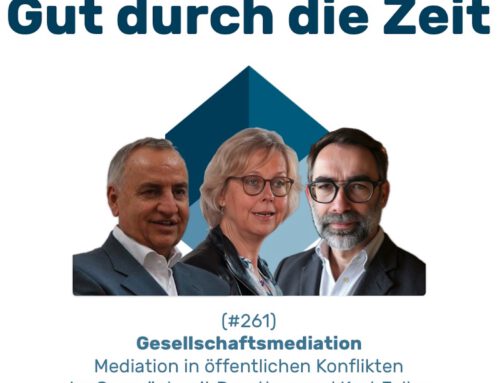INKOVEMA Podcast „Well through time“
#227 GddZ
Mediation and administration
Mediation within the administration is different from mediation with the administration.
In conversation with Greg Bond
Mediator, facilitator, trainer, lecturer and translator; Mediator BM®. Member of the scientific advisory board of the Master's programme in Mediation and Conflict Management at the European University Viadrina. Member of the mediator pool of the state of Brandenburg. Advisory board member of the Mediation Centre for Europe. Member of working groups at the Competition for International Commercial Mediation at the International Chamber of Commerce, Paris, at the Moot Court Bench, Colombo, and formerly at the CDRC – Consensual Dispute Resolution Competition, Vienna. Since 1994 at the Technical University of Applied Sciences Wildau, teaching Negotiation and Mediation and Intercultural Communication. Professor of Mediation at the New Vision University Tbilisi.
Small series: Fields of mediation
Contents
Chapter:
0:05 Welcome to the podcast Gut durch die Zeit
1:32 Greg Bond's experience in mediation
4:55 Mediation in the public sector
7:45 Challenges in administration
10:49 Systemic considerations in conflicts
15:15 Order clarification and hierarchies
18:45 Patience and process design
22:51 Voluntariness and participation
26:05 Results and decisions
33:42 Trends in mediation
36:30 Individual discussions in mediation
39:39 Conclusion and outlook on the work
Summary
In this episode of the podcast „Gut durch die Zeit“ I shed light on the logic of the Mediation in the context of administrative organisations. With my guest, Greg Bond, a seasoned mediator with extensive experience in government, we discuss the specific challenges and opportunities of mediation in this area. Our discussion begins with a consideration of the role and development of mediation in government, a field originally intended for mediation but which has faced many hurdles in practice.
Greg, who is originally from the UK and came to Germany in the 1980s, talks about his career and mediation experience. His journey began in teaching and evolved into the practices of conflict management within public administrations through an in-depth mediation training programme at the European University Viadrina. We shed light on the complexity of how mediation works within hierarchies and the impact these hierarchies have on the dynamics of conflict. Greg emphasises that mediation in the public sector does not necessarily involve more difficult conversations, but often faces specific institutional challenges that are very different from the private sector.
A key issue is understanding that mediation in administration does not always take legal structures into account. Rather, it is an endeavour to build interpersonal relationships and an appropriate conflict culture. We discuss the various parameters and challenges that mediators need to consider when working with public authorities and administrative organisations, in particular the tension between the expectations of management and the needs of employees.
We also look at how the Visual concept of "opening spaces" versus "seeking paths" in mediation is important in administrative organisations. Greg shares his observations that opening up spaces for dialogue often does not provide the expected creative freedom, while finding workable ways to deal with conflict is seen as more appropriate. This picture opens up interesting perspectives on how mediators should operate in administration, but also recognises that flexibility and creative solutions are often limited within highly structured frameworks.
Another focus is on clarifying the mandate and the important one-to-one discussions, which are often neglected in mediation practice. Greg emphasises how essential these one-to-one meetings are in order to develop an understanding of the parties involved and their motivation. This dimension becomes even more important as the voluntary nature of mediation is often not given to the extent that would be desirable. Instead, mediators must accept the reality that many parties do not participate in these processes entirely voluntarily, which can affect their engagement and the quality of outcomes.
To conclude the episode, we take a look at developments and trends in mediation, particularly in the wake of societal changes and the pandemic. Greg has seen an increase in demand for mediation services in recent years, but also recognises that this perception is not necessarily representative of the field as a whole. Nevertheless, there are signs that the topic of conflict culture is becoming increasingly important in organisations, which can be interpreted as a positive signal for the future of mediation in administration.
Overall, the episode offers valuable insights into the world of mediation within the administration and gives practitioners ideas on how to prepare for the complex challenges of the field.
Complete transcription





Leave A Comment